Climate crisis, disaster management and African libraries – webinar

PUBLISHED: JULY 1, 2022 UPDATED: JULY, 9, 2022
Our planet is facing an existential threat. Climate change, increasing loss of biodiversity, degradation of ecosystems and pollution are threatening our very existence. Seasons are shifting. Droughts, floods, heatwaves, wildfires and desertification are happening more than before even as different species of flora and fauna struggle to adapt to the changing climate. The climate crisis is hitting Africa hard. “Climate change is having a growing impact on the African continent, hitting the most vulnerable hardest, and contributing to food insecurity, population displacement and stress on water resources… devastating floods, an invasion of desert locusts and now the looming spectre of drought…“
Holistic transformative options that are available and affordable need to be openly accessible to people so they can make better daily decisions. This is critical as research suggests that if we all as humans change our lifestyles and behaviours in order to cut down emissions that can save our planet then that will be the beginning of the collective action that can save our planet. African libraries are bastions of knowledge that can assist greatly in disseminating information about the climate crisis to their varied communities of users through which collective action to save our climate can be catalysed and amplified.
Furthermore, climate crisis and the ensuing environmental degradation increase the risk of disasters as the capacity of the environment to perform nature-assigned roles become diminished. AfLIA had carried out a survey in 2020 which showed that quite a number of African libraries do not have emergency preparedness plans.
Join us in these webinars on 13-14 July, 2022 as we discuss how libraries can be pivotal in fighting this existential threat (first webinar) and how these institutions of knowledge and heritage can be protected in times of disasters (second webinar). There will be a practical on development of draft policies for disaster management for knowledge and heritage institutions in Africa.
Expected outcomes
- Raise awareness and highlight the climate crisis among African knowledge and heritage institutions.
- Understand the prevailing agreements by governments and organizations on the climate crisis and disseminate information on such.
- Understand key terms in climate crisis.
- Encourage and support innovations targeted at finding solutions for waste disposal, pollution and gas emissions.
- Increase the narratives and voices for climate equity and sustainable lifestyle changes.
- Understand the key principles of disaster management.
- Work on draft policies for disaster prevention, preparedness, response and recovery in a practical session.
Date: Wednesday, 13th July 2022 and Thursday, 14th July, 2022
Time: 12 noon UTC | 12 noon GMT | 1PM WAT | 2PM CAT | 3PM EAT
Registration
This is a free webinar. After completing the registration form, you will receive notification via email with details of how to join the webinar.
Carefully read the section on Technical Requirements to help you prepare adequately for this webinar.
Technical Requirements
Upon registration, reminders will be sent to all registrants periodically. This webinar will be hosted on Zoom Conferencing Platform. Participants, who do not have Zoom on their mobile devices and or computers, need to download, install and create an account on Zoom ahead of time (CLICK TO DOWNLOAD). Webinar attendees are encouraged to join early, preferably 15 minutes before the start of the webinar, as one may need time launch the application. The speaker will use a webcam to connect with attendees. Audio and video for the session will be streamed over computer speakers. Attendees are therefore encouraged to connect with a headset or earpiece for maximum utility. Please note that this webinar does not involve certificate of participation.
Webinar Materials
A list of resources and further information will made be available at the end of the webinar, to enable thorough engagement with the webinar content. All registrants will have access to the presentation slides. The webinar recording will be uploaded on AfLIA Youtube Channel soon after the webinar to facilitate continuous engagement with the webinar content by webinar attendees and non-attendees. Webinar attendees who are fully present for webinar may be eligible for a certificate of participation from AfLIA.
Queries
For further enquiries and any assistance relating to the webinar, contact us at afliacomm@aflia.net.
